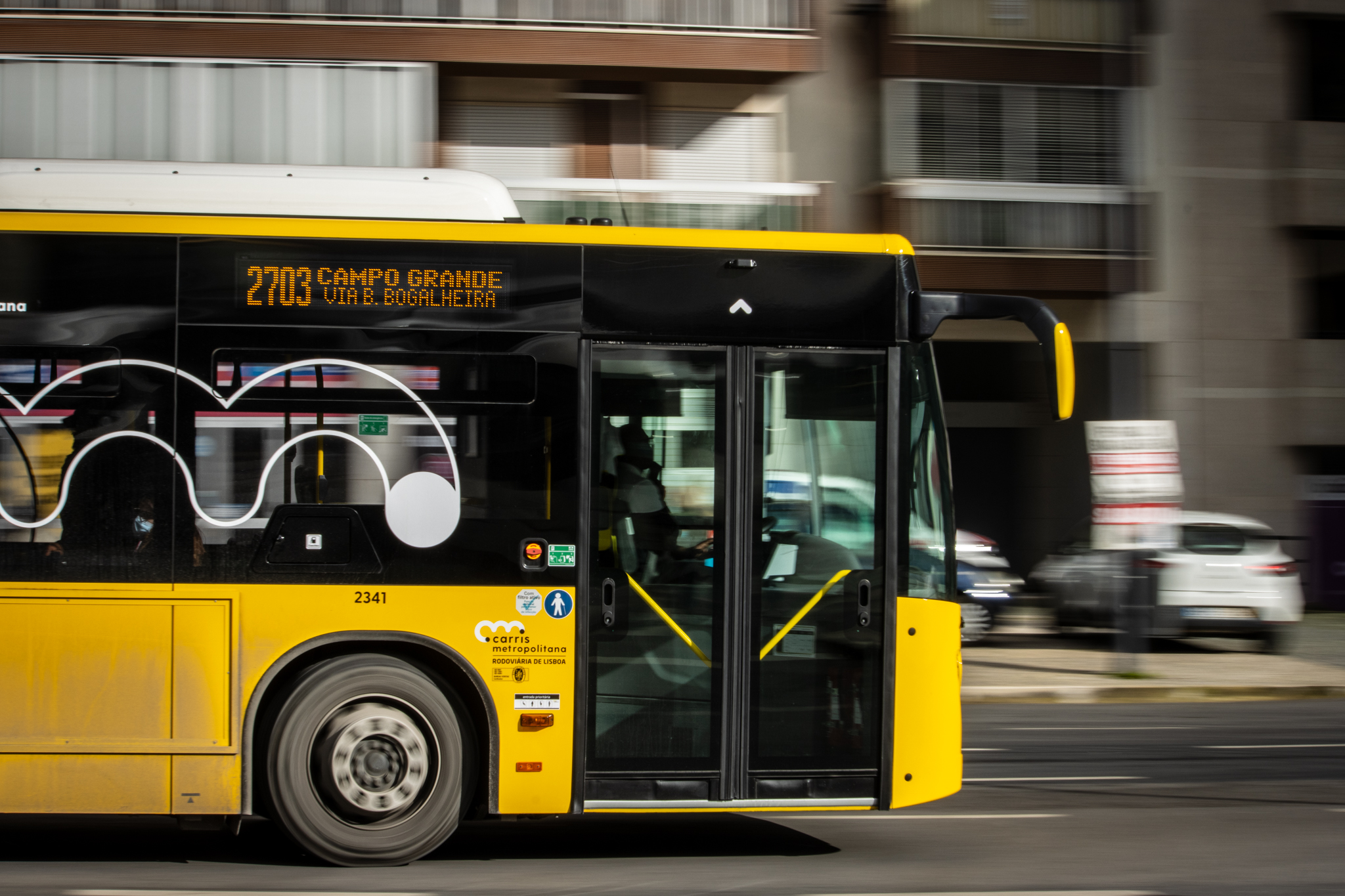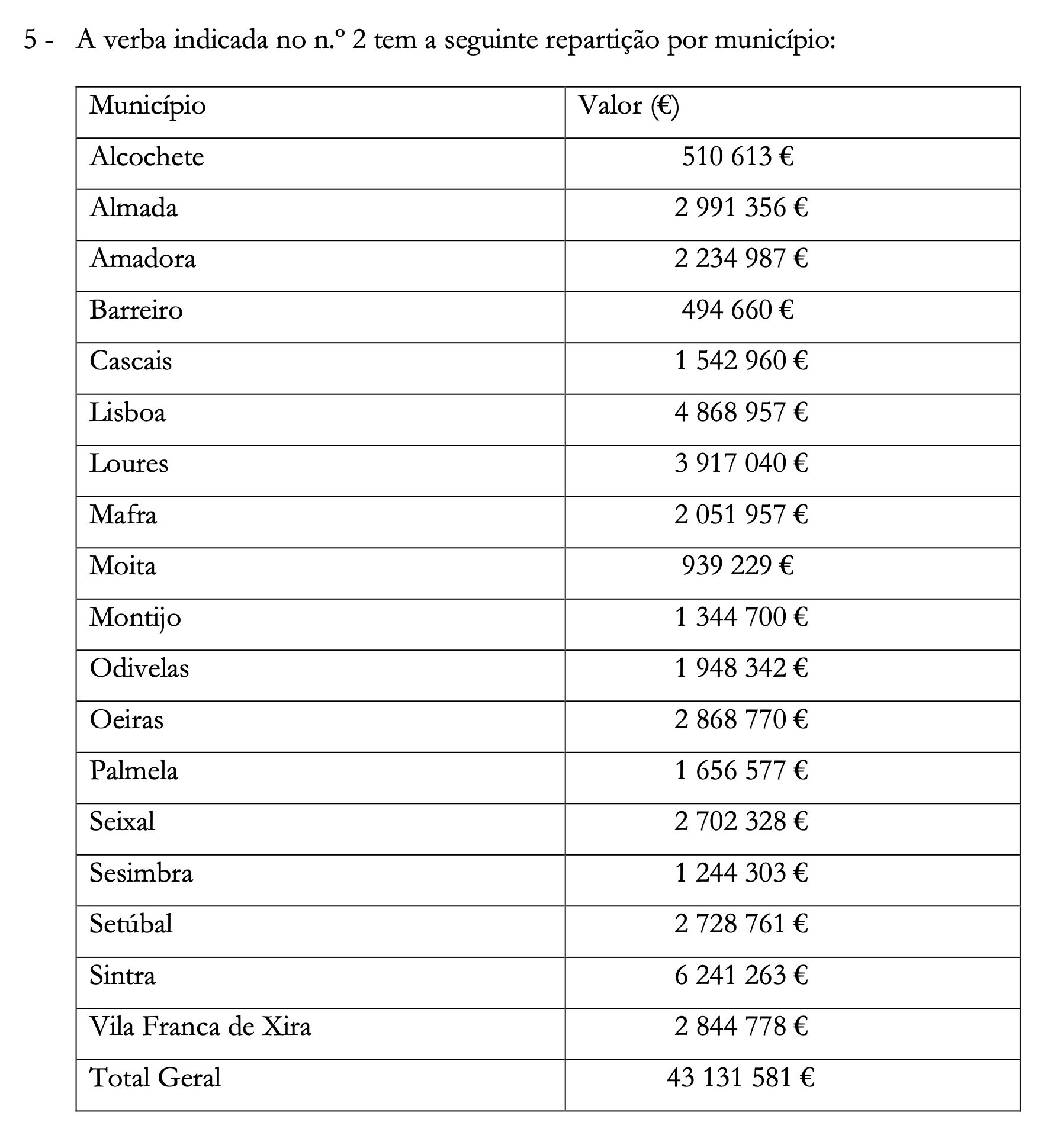The government has already presented its proposal for next year's State Budget, 2024, and there are several new developments in the field of mobility and transport, affecting the Lisbon metropolitan area.

The main daily flows that occur in the Lisbon metropolitan area are inter-municipal and centered on the capital: from outside to Lisbon, and from Lisbon to outside. And part of this mobility is defined at central state level through the much vaunted State Budget. In fact, many of the transport operators depend directly on the government; on the other hand, the money that reaches the Lisbon Metropolitan Area to maintain, for example, the price of passes or make investments in rolling stock, infrastructure or human resources also depends on a central decision.
That's why The State Budget is also an important instrument for the future of metropolitan mobility. And in the SB proposal for next year 2024 there are several new features in this area, such as a "more balanced, stable and predictable" the financing of metropolitan public transport and the extension of free passes to all young students up to the age of 23/24. The SB 2024 proposal states that "the sustainability of economies requires greener mobility and a reduced ecological footprint".
Let's move on to the concrete proposals. In this analysis, we will focus on the Lisbon metropolitan area, but the measures described here are national in scope.
The proposals
- Free transport for students
- Discount on transport for the long-term unemployed and people with disabilities
- The end of PART and the new "Incentiva +TP"
- Swapping your old car for an electric cargo bike or public transport
- Repayment of CP's historic debt, investments and the purchase of trains
- Pensioners can return to CP and Metro
- 1 million for Active Mobility
Free transport for students
By 2024, everyone studying in the Lisbon metropolitan area will benefit from free public transport. The measure that the municipalities of Cascais and Lisbon launched in 2020 and 2022, respectively, will now be extended to the entire Lisbon metropolitan area and beyond - it will be a national measure for young students across the country.
Currently, young people in primary, secondary and higher education have access to the Navegante pass with 25% discountIf they come from families in need, for example, the discount is already 60%. At the same time, since 2022, students living in Lisbon have been able to take municipal public transport without paying; in Cascais, only the buses of the municipal operator MobiCascais are free for the entire population of the municipality, not just students.
The government estimates that around 370,000 students (out of a potential universe of 1.7 million people) will join this measure, which will represent an increase of 36% compared to the young people who currently use transport through the "4_18" and "sub23" subscriptions. António Costa's government hopes that with this measure, which is budgeted at 126 million euros, it will achieve a "adoption of sustainable mobility patterns by the younger population" and also a "increase in household disposable income".
Discount on transport for the long-term unemployed and people with disabilities
The long-term unemployed and people with disabilities (disability equal to or greater than 60%) will now benefit from discounts of between 25% and 50% on the price of public transport passes, including Navegante passes. In the SB 2024 proposal, it is not yet clear whether the discount will be 25% or 50%. However, this measure results from an extension of the beneficiaries of the "Social+" discounts.
Currently Social+" discounts are available to elderly people receiving pensions, low pensions or the so-called Solidarity Supplement for the Elderly, unemployed people receiving Unemployment Benefit, low-income families and beneficiaries of the Social Insertion Income (RSI). There are two discount levels: 25% and 50%. A Navegante pass to travel within a municipality can cost 15 or 22.5 euros.
With the 2024 State Budget, "Social+" fares will be moved out of metropolitan areas and made available to the whole country. The government estimates that 2.7 million people will benefit from cheaper public transport and a budget impact of 8.8 million euros per year.
The end of PART and the new "Incentiva +TP"
If Navegante passes cost only 30 or 40 euros/month since 2019, it's because every year the government has subsidized the real cost of the passes, through the State Budget and a program called PART - Public Transport Fare Reduction Support Program.
In practice, since 2019, the government has been transferring, for example, funds to the Lisbon Metropolitan Area (AML) to enable it to provide public transport at more attractive prices, through a single intermodal pass, the Navegante, without the transport operators losing money. However, both AML and Transportes Metropolitanos de Lisboa (TML) had already asked for a funding mechanism for public transport that is more certain and more integrated into the State Budget. That's what the government is proposing now.
If PART was a transitional program that allowed for a more accessible and integrated transport paradigm in metropolitan areas (and beyond), the new Incentive +TP is a program that aims to continue this work. Through this Incentiva +TP, the Lisbon Metropolitan Area, the Oporto Metropolitan Area and the Intermunicipal Communities will have funds for the "financing and promoting public transport"Each inter-municipal entity is responsible for "identify the most effective measures to increase demand for public transport and ensure the sustainability of the operations under its charge".
However, the government has set some limits: "The actions to be financed include support for the reduction of fares, the payment of Public Service Obligations arising from the contractualization of public transport services and support for the reinforcement of supply, whether through regular or flexible public transport services." Like PART, the Incentiva +TP program will be financed by carbon revenue, i.e. the revenue the state collects from individual transport. "This mechanism assumes a sharing of risks underlying the variation in carbon revenues"explains the Central Executive.
In addition to PART, the new program replaces PROTransP - Program to Support the Densification and Strengthening of the Public Transport Offer. For the country as a whole, the budget is 360 million euros (an increase of +91 million euros compared to 2023). AML will receive around 43.1 million in 2024The measure is based on the demand for public transport in the current year. The beneficiaries of the measure are the more than five million Portuguese on mainland Portugal who regularly travel within their territories, in particular the 730,000 inhabitants who regularly use public transport.

Swapping your old car for an electric cargo bike or public transport
In the State Budget for 2024, the government is proposing a program to encourage the scrapping of end-of-life cars, i.e. those registered until 2007. Anyone who has a car from 2007 or older will still be able to give it away and receive from the state a "check" that you can exchange for a Mobility Card (to spend on public transport or shared mobility services), an electric cargo bike or an electric car.
With this measure, which will be excepted through the Environmental FundAntónio Costa's Executive intends to "reduce the average age of national fleets and thus improve road safety and environmental quality"But at the same time, it is giving a signal in favor of cycling (cargo bikes can be a substitute for cars in many circumstances) and collective mobility.
The SB 2024 proposal estimates that 45,000 vehicles will be scrapped in 2024, with a budget of 129 million euros set aside for this measure. In addition to this scrappage incentive program, the government is going to increase the Single Road Tax (IUC) for vehicles prior to 2007, "as a complementary measure to strengthen the renewal of national fleets".
Repayment of CP's historic debt, investments and the purchase of trains
O settling CP's historic debt to the state was foreseen in the 2023 State Budget and is now being implemented at the end of this year, during the discussion of the new State Budget. This reform is being carried out with a 1.9 billion capital injection into the public railway operator (CP had a total debt of 2.1 billion euros, of which 1.8 was owed to the state itself). The resolution of this debt - which resulted from years of operation in which the State "asked" CP to do public service without giving it the resources to do so - was essential for the company to be able to move forward with certain investments, such as the purchase of new trains for long-distance services (Alfa Pendular and Intercidades). "This operation gives CP effective conditions to fulfill the public service obligations contracted with the State and to compete in the long-haul market, which operates in competition under European rules", explains the government in a statement.
In 2022, CP recorded profits for the first time in its history and because of this, the public railway company will have to pay dividends of 1.78 million euros to the state, according to the State Budget for 2024 (note: dividends are a portion of the profit of companies that goes to shareholders as a form of remuneration; in the case of CP, the state is a shareholder). "In 2024, CP intends to start manufacturing up to 117 new electric railcars (up to 62 for urban services in Lisbon and Porto and up to 55 for regional services). The rehabilitation of rolling stock will continue in order to meet the needs of this material until the delivery of the new railcars, with a view to improving and increasing CP's offer."can be read in the proposal for the new State Budget. "It is also planned to carry out the project called 'Portuguese Train', by manufacturing a prototype of a train produced in Portugal, with a view to assessing its commercial viability, a project financed by European funds."
On the Lisbon Metro side, investments in infrastructure will continue: the investment of 258 million euros for the construction of the Violet Line (97 million of which will have to be spent by 2024), the investment of 409 million for the expansion of the Red Line to Alcântara (137 million in 2024) and the completion of the 335 million investment to close the ring road between Cais do Sodré and Rato (159 million in 2024). Metro de Lisboa is also in the process of acquiring 14 new triple units (42 carriages) with a new signaling system, an overall investment of 114.5 million euros.
For its part, Transtejo (part of the TTSL group) "will continue to implement its fleet renewal plan, which includes the acquisition of around ten new electric shipsThe purchase and construction of charging stations and their maintenance have already been awarded"can be read in the State Budget 2024. "In 2023, the first of these ships was delivered and made its maiden voyage for testing and training. The construction of the others is underway. This investment will enable Transtejo to enhance its mission as a public river transport operator, at the service of mobility and people's quality of life, and to contribute to the decarbonization of the sector."
Pensioners can return to CP and Metro
At the same time, and in order to address the shortage of skilled railroad workers needed in CP or Metro operations, the 2024 State Budget proposal suggests that retirees from these transport companies, who used to work in carriage maintenance or driving trains, should be able to return to work, keeping their pension and receiving up to 75% of the salary corresponding to the category they will occupy.
"Retired persons with relevant experience in the areas of rolling stock maintenance or as a train driver may work for public companies in the railway sector that provide public passenger transport, maintaining their retirement pension, plus up to 75% of the remuneration corresponding to their category and, as the case may be, step or remuneration position held on the date of retirement, as well as their work regime."details the document.
1 million for Active Mobility
The SB 2024 proposal allocates one million euros to give it "continuity in the implementation of the National Strategy for Active Mobility, in the Cycling and Pedestrian components". The Instituto da Mobilidade e dos Transportes (IMT) will continue to be in charge of implementation. Currently, there are two strategic documents - one for cycling, which is four/five years old, and another for pedestrians, which was completed this year.
Together, these strategies aim to increase the modal share of cycling to 10% in cities by 2030 (7.5% nationally) and walking to 35%. However, associations such as MUBi - Associação pela Mobilidade Urbana em Bicicleta (Association for Urban Mobility by Bicycle) say that the government has been slow and has invested little in the development of active mobility, not only cycling but also walking.
In this year's State Budget, the IMT also received one million euros for active mobility. Nevertheless, in the 2024 State Budget, the government promises to "strengthening active mobility solutions in cities, in particular through the construction of new clickable road networks"The documents submitted do not detail this issue.










